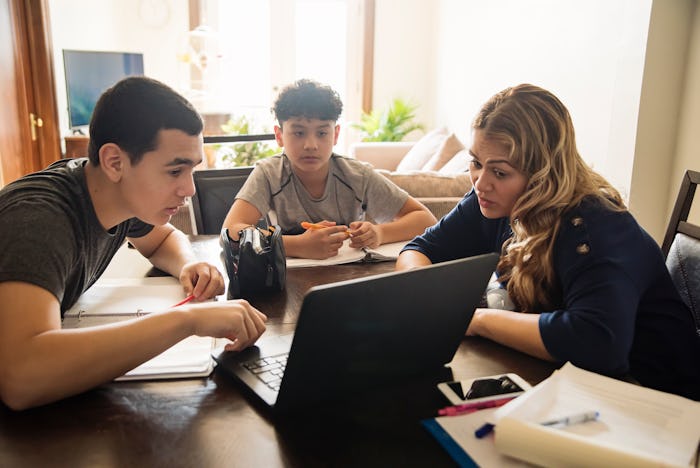News

Not All Parents Will Get $500 Per Child In Their Coronavirus Stimulus Check
The Internal Revenue Service (IRS) has started issuing millions of coronavirus stimulus checks and while most Americans will, at some point, receive the government's one-time economic relief payment, a number of individuals stand to be left without help, including some dependents. So which dependents qualify for a stimulus check and which don't? Not every child qualifies for economic relief.
As part of Congress' $2 trillion coronavirus relief package, the IRS issued roughly 60 million stimulus payments to eligible taxpayers over the weekend, according to a memo from the House Committee on Ways and Means. Under the plan, eligible individuals who earned less than $75,000 in 2019 will receive a one-time, direct payment of $1,200. Married couples who file jointly and earned less than $150,000 will receive $2,400. Eligible taxpayers who claim dependents under the age of 17 will also receive an additional $500 for each qualifying child.
Unfortunately, that means a 17-year-old high schooler who still lives at home and eats from their parents' fridge is not considered to be a dependent who qualifies for additional stimulus money and their parents shouldn't expect to receive $500 for them. The same goes for many college students who, due to school closures, have returned home and are now being financially cared for by their parents.
So, what's going on? Why have so many young people been effectively left of out Congress' coronavirus relief package? The answer lies in both the language of the approved stimulus bill and the IRS' rules for qualifying dependent children.
Under IRS rules, dependents must be either a qualifying child or a qualifying relative of the taxpayer. To count as a qualifying child, the potential dependent must be either under the age of 19, under the age of 24 and a full-time student, or any age if permanently disabled. They must also have lived with you for more than half the year, although exceptions for school, military service, and vacations do apply. Additionally, to qualify as your dependent, you must also have provided more than half of the child's support. But that doesn't mean the child can't have worked or held a job.
For example, a 21-year-old full-time college student who lives in a dorm during the school year and works part-time in a coffee house can still be claimed as a dependent if the money they earn does not go towards covering the cost of more than half their total support (say, if their parent covers the cost of their schooling, health insurance, cell phone bill, and car insurance). While that 21-year-old won't garner their parents an additional $500 stimulus payment under Congress' plan, they're dependent status also makes them ineligible to receive their own stimulus check. Essentially, they, and their parents, get nothing.
According to NBC News, the same goes for disabled children or relatives aged 17 or older who are claimed as dependents. They won't receive a stimulus check of their own and the person claiming them as a dependent won't receive the $500 dependent payment. Other dependents who don't qualify for any of Congress' stimulus payments include senior-aged parents who are claimed as dependents by their adult children and babies born in 2020, and thus not claimed on 2019 tax returns. That being said, NBC News has noted that parents of children born early in 2020 will likely receive a $500 stimulus payment for the child when they file their 20202 taxes.
At least one congressional lawmaker has acknowledged in an interview with ABC 12 that, in drafting and passing the relief package so quickly, college students and other older dependents fell through the cracks. According to the news outlet, Congress is now considering legislation that would expand the $2.2 trillion CARES Act to include stimulus payments to older children.
If you think you’re showing symptoms of coronavirus, which include fever, shortness of breath, and cough, call your doctor before going to get tested. If you’re anxious about the virus’s spread in your community, visit the CDC for up-to-date information and resources, or seek out mental health support. You can find all of Romper’s parents + coronavirus coverage here, and Bustle’s constantly updated, general “what to know about coronavirus” here.